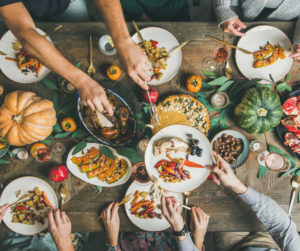Thanksgiving and the Problem of Instant Gratification

This article is by Thaddeus Camlin, Psy.D. and published by Practical Recovery
Somehow Thanksgiving, our holiday of gratitude, has morphed into a gluttonous melee of over-indulgence and excess. If there is ever a time to practice coping with urges, resisting temptations, and moderate indulging, it is amidst the relentless onslaught of food and drink offerings that we are bombarded with throughout the celebratory festivities of November’s fourth Thursday.
The P.I.G., or Problem of Instant Gratification, is a hallmark of the feverish consumer culture that abounds today. As if the multitudinous dishes of the Thanksgiving meal weren’t enough, now we have trample-happy shopping sprees to add to the frenzied fervor of our most indulgent holiday. One-click buying, drive-through “dining,” over-night shipping, instant gifting, as the Willy-Wonka song astutely foreshadowed, we all “want it now.”
The problem with the P.I.G. is that immediate gratification often has greater influence on us than healthier, delayed rewards. Repeating the pattern of instant gratification reinforces the P.I.G., and every time we give into an urge or get what we want now, the P.I.G. grows. Defeating the P.I.G. starts with stopping.
If we don’t give in to urges, they become less intense and occur less frequently. Some call the process of defeating the P.I.G. the Principle of Benign Deprivation. With a cornucopia of indulgences before us this Thanksgiving, we can select a few to intentionally deprive ourselves of in order to shrink the P.I.G.
While intentionally resisting urges shrinks the P.I.G., the sheer abundance of Thanksgiving also serves as a tangible reminder of all that we have in our lives. Thanksgiving offers us a moment to pause and appreciate the incredible fortunes in life, which are concretely symbolized by the turkey, ham, mashed potatoes, cranberry sauce, stuffing, fresh rolls, casserole, pumpkin pie, and anything else we have the opportunity to enjoy. Using the Thanksgiving meal as a catalyst for cultivating a deep sense of gratitude and reverence may even make interactions with that particularly difficult loved one a little more enjoyable.